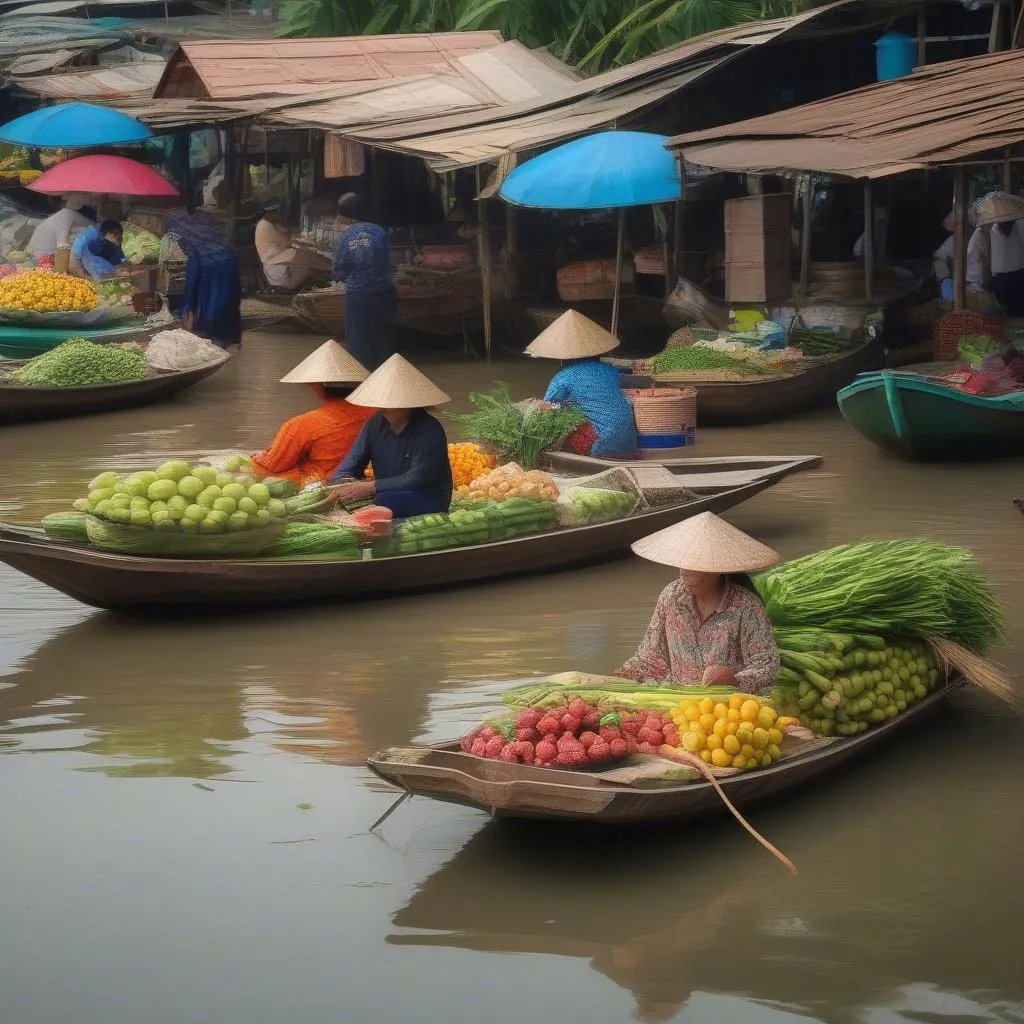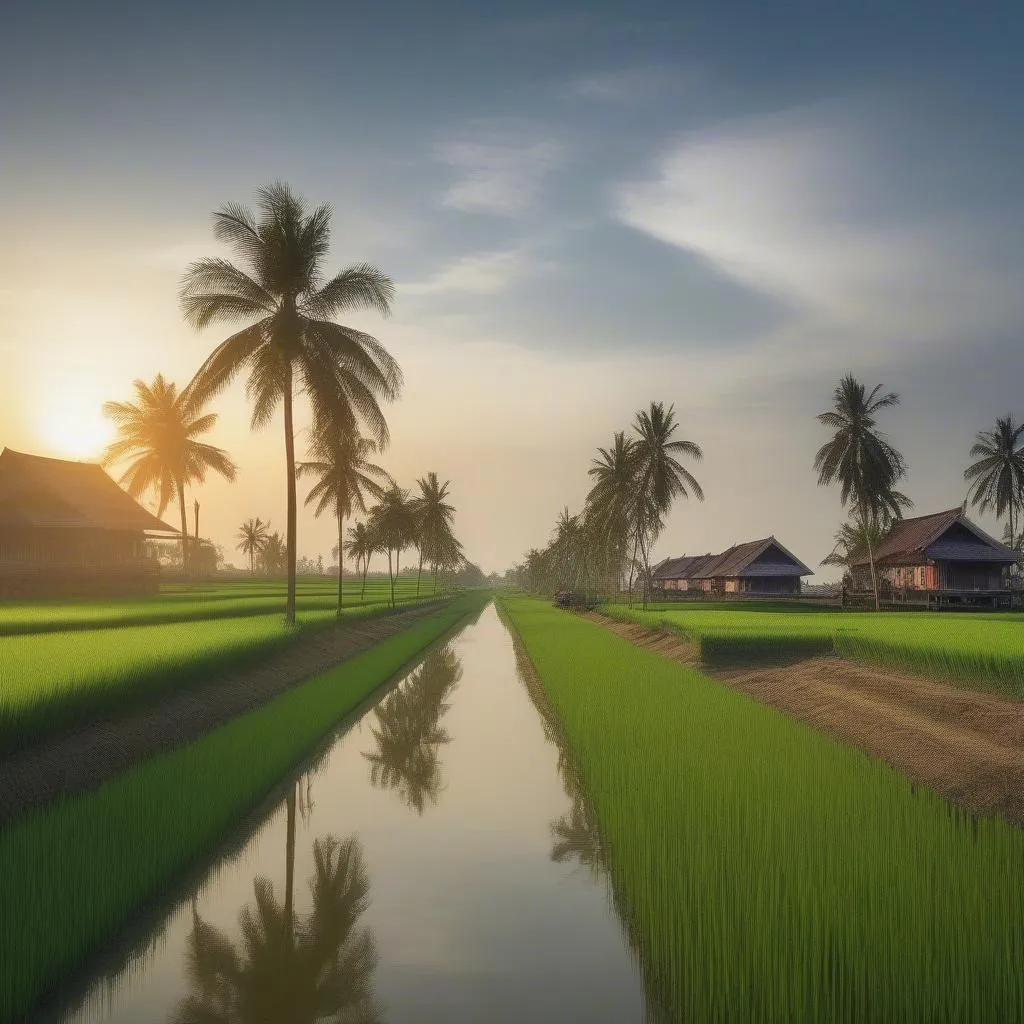“Going with the flow” takes on a whole new meaning in the Mekong Delta. Imagine a place where rivers are like roads, boats are buses, and floating markets burst with life at dawn. This is Vietnam’s Mekong Delta – a mesmerizing tapestry of waterways, lush rice paddies, vibrant cultures, and warm hospitality. Whether you’re a seasoned traveler or a curious soul seeking new horizons, the Mekong Delta promises an unforgettable adventure.
Delving into the Depths: What Makes the Mekong Delta Special?
The Mekong Delta, also known as Vietnam’s “rice bowl,” is a vast network of rivers, canals, and islands where life revolves around water. It’s a place where time seems to slow down, and nature’s bounty takes center stage.
Crafting Your Mekong Delta Adventure: A Comprehensive Guide
1. When to Go: Embracing the Seasons
The Mekong Delta welcomes visitors year-round, each season painting a different stroke on its natural canvas.
- November to April (Dry Season): Experience sunny skies and pleasant temperatures – ideal for exploring floating markets and enjoying outdoor activities.
- May to October (Rainy Season): Witness the delta come alive with lush greenery and bustling waterways. While you might encounter some rain, it’s also a time for fewer crowds and lower prices.
Expert Tip: Mr. Nguyen Van Minh, author of “The Rhythm of the Mekong,” recommends visiting during the floating market festivals (like the Cai Be Floating Market Festival) for a truly immersive cultural experience.
2. Getting There: Navigating the Waterways
- From Ho Chi Minh City: The most convenient gateway to the Mekong Delta, offering various transportation options.
- By Bus: Affordable and readily available, with frequent departures from Ho Chi Minh City to major delta towns like My Tho, Ben Tre, and Can Tho.
- By Boat: For a more scenic route, embark on a boat trip along the Mekong River, soaking in the picturesque landscapes.
3. Essential Experiences: Unraveling the Magic
- Floating Markets: A sensory overload of sights, sounds, and aromas! Visit Cai Rang (Can Tho), Phong Dien (Can Tho), or Nga Bay (Phung Hiep) to witness the vibrant trade of fruits, vegetables, and local crafts.
- Boat Tours: Cruise along the intricate canals, passing by stilt houses, verdant orchards, and traditional villages. Don’t miss the opportunity to venture into the narrow “monkey bridges” for a thrilling experience!
- Cycling Excursions: Pedal through the peaceful countryside, stopping by local homes to savor freshly made coconut candy and learn about rice paper production.
- Homestay Experience: Immerse yourself in the local way of life by staying with a host family. Share meals, learn traditional crafts, and create lasting memories.
 Floating Market
Floating Market
4. Approximate Budget: Planning Your Finances
- Accommodation: From budget-friendly guesthouses to comfortable hotels, expect to spend around $10-50 per night.
- Food: Indulge in delicious local cuisine at affordable prices, with meals costing approximately $5-15 per day.
- Transportation: Local buses and boat rides are inexpensive, while private tours can range from $20-50 per day.
5. Mekong Delta Delights: Unveiling the Culinary Treasures
- Hu Tieu My Tho: A flavorful noodle soup originating from My Tho, featuring pork, shrimp, and a special clear broth.
- Banh Xeo: Vietnamese savory crepes filled with pork, shrimp, bean sprouts, and served with fresh herbs and dipping sauce.
- Ca Kho To: Braised fish in a clay pot, a signature dish of the Mekong Delta, known for its rich flavor and tender fish.
6. Navigating the Delta: Tips for a Smooth Journey
- Respect Local Customs: Dress modestly when visiting religious sites and be mindful of local traditions.
- Bargaining is Key: Negotiate prices at markets and for transportation, but always do so respectfully.
- Stay Hydrated: Carry a reusable water bottle and stay hydrated, especially during boat trips and outdoor activities.
7. Mekong Delta Magic: Feng Shui and the Flow of Fortune
In Feng Shui, water represents wealth and prosperity. The Mekong Delta, with its abundance of water, is believed to be a place of great auspicious energy.
- Embrace the Flow: Just like the Mekong River, be adaptable and open to new experiences.
- Seek Harmony: The delta teaches us about balance – the balance between humans and nature, tradition and modernity.
 Rice Fields
Rice Fields
Local Legend: According to folklore, placing a small offering of flowers and incense on the Mekong River during a full moon is said to bring good luck and fortune.
Frequently Asked Questions: Unraveling Your Queries
Q: What is the best time to visit the floating markets?
A: Aim to arrive early in the morning (around 6-7 am) when the markets are at their liveliest.
Q: Is it safe to drink the tap water in the Mekong Delta?
A: It’s generally recommended to stick to bottled water for drinking.
Q: What language is spoken in the Mekong Delta?
A: Vietnamese is the official language, but English is widely spoken in tourist areas.
Embark on Your Mekong Delta Journey
The Mekong Delta is more than just a destination; it’s a journey into the heart of Vietnamese culture and natural beauty. From the vibrant floating markets to the serene countryside, the delta promises an enriching and unforgettable experience. Start planning your adventure today and discover the magic that awaits! For more travel tips and inspiration, visit travelcar.edu.vn and let us guide you on your next adventure.